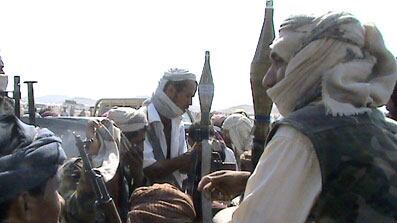In the nine years since al Qaeda's attack on the U.S., Yemen has emerged as the group's staging ground the U.S. fears most. Ellen Knickmeyer reports from terrorism's new ground zero. Plus, our complete coverage of the anniversary.
On a recent evening, I visited a Yemeni businessman who, after dinner, gave me a tour of his basement. What he wanted to show me was his stockpiles of water, rations, ammunitions and a crated, padlocked item that he identified as an anti-aircraft weapon. He gleefully took aim at his ceiling and mock-strafed imaginary F-16s. “We are all ready,” he said, with the mixture of hospitality and incipient lethalness that one finds here. “Every house in Yemen has this.”

Welcome to terrorism’s new ground zero. In the nine years since 9/11, al Qaeda’s base has shifted—under steady assault from the US and its allies—from Iraq and Afghanistan to Pakistan and Somalia. But the most dangerous territory—the one the intelligence community fears most—is Yemen.
Today, U.S. intelligence officials consider al Qaeda groups in this poor, ill-governed southern Arabia nation the largest current threat to the United States.
To ward off future attacks against the U.S., the administration has deployed Navy ships off Yemen’s coast as stages for cruise-missile strikes and other sorties. American commandos are helping train Yemen’s special-operation squads and conducting operations of their own. The administration has provided Yemeni special-ops with gear ranging from Humvees and night-vision goggles to arms and ammunition.
The Central Command has further proposed a $1.2 billion military-aid program to help the government of Yemen fight al Qaeda groups, and this week, a government counterterrorism official said that the U.S. government will provide as much as $300 million in military and humanitarian aid this year.
Among Yemenis, the prospect of what many fear may be an imminent escalation of the U.S. military and intelligence efforts raises hackles.
My host gleefully took aim at his ceiling and mock-strafed imaginary F-16s. “We are all ready,” he said, with the mixture of hospitality and incipient lethalness that one finds here. “Every house in Yemen has this.”
Yemen President Ali Abdullah Saleh, whose more than 30 years of rule has done little to benefit ordinary Yemenis, has no shortage of critics among his people. Yet even Saleh’s opponents are ready to rally against the growing outside interference. “What Americans don’t appreciate is, each drone strike they do here, kills one or two al Qaeda members—and recruits hundreds,” warns Abdul Ghani al-Iryani, an analyst in Yemen’s capital, Sana’a.
As U.S. involvement in Yemen grows, Saleh’s government has sought to dupe Americans into believing that his political foes are really al Qaeda, critics say. One Yemeni, a dissident, so fears being mistaken for being one of bin Laden’s fellow-travelers, he insists on beginning interviews by humming "The Star Spangled Banner," while waving two tiny American flags.
• Full coverage of the 9/11 anniversaryA former military intelligence source in Washington with access to policymakers says that American intelligence officials rate Yemen a more serious threat than Pakistan in terms of al Qaeda, adding that that view is being championed in the White House by John Brennan, Obama's counterterrorism adviser. After Yemen, he says, they rate the chief threats as coming from Iran, Pakistan, and Somalia.
In Sana’a, the sense is that of a battle joined. Yemeni security forces have allegedly stopped would-be suicide attackers headed for targets in the capital, and each day brings news of al Qaeda attacks on Yemeni forces, or government claims of arrests of al Qaeda fighters. In a television address for the start of the Eid holiday this week, Saleh sought to drum up support for his government by urging Yemenis to unite against the terror group.
The increased U.S. attention on Yemen comes in part because of the presence of Yemeni-American Anwar al-Awlaki who, from his base here, is proving gifted at drawing disgruntled young Muslim Americans into jihad.
The United States has linked al-Awlaki to last year’s Fort Hood shootings that killed 13 people, and the failed attempt to bring down a Northwest Airlines flight to Detroit by the “underwear bomber,” as well as this year’s attempted attack on Times Square.
But Yemen has long been a safe-haven for al Qaeda.
Almost a year before the 9/11 attacks, 17 American sailors were killed in a suicide attack against the USS Cole, a Navy destroyer harbored in the port of Aden—an attack that al Qaeda claimed responsibility for. And earlier this year, the U.S. administration shut down the U.S. Embassy in Sana'a for fears of a terrorist attack.
Yemen’s government used to tolerate al Qaeda figures here as long as they did not target Yemeni forces. But critics of Saleh’s regime now charge that the president is trying to play a double-game, using the American-funded military equipment on dissidents not connected to al Qaeda.
Faris Manaa, one of the most prominent among the nation’s many arms-dealers, claims Humvees and a new style of sniper rifle are starting to turn up in the Yemeni government’s fight against rebels in the north—a Shiite Muslim band with no discernible link to al Qaeda, a Sunni Muslim group. The Yemeni government takes this American assistance and uses it against Yemeni rebels, Manaa says. “It’s being used to make Saleh stronger.”
American officials are fully aware of the risk of Saleh diverting U.S. military aid. And, after open war in Iraq and Afghanistan, American officials are keen to keep the military and intelligence presence covert for fear that the killing of civilians in more heavy-handed attacks could inflame public opinion in this heavily armed country.
Yemen, they realize, could become the next powder keg.
Ellen Knickmeyer is a former Washington Post bureau chief in Baghdad and Cairo. Before coming to the Post, she was the West Africa bureau chief for The Associated Press. This year, she graduated from Harvard University’s Kennedy School of Government.






